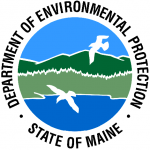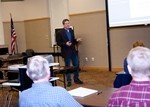The Colorado Department of Public Health and Environment enforces the Colorado state regulations under the authority of the Federal Resource Conservation and Recovery Act (RCRA). RCRA provides for authorization of a state hazardous waste program as long as its regulations are at least as strict and as broad as those of the USEPA. State regulations that are more strict and more broad are allowed as well. If you do business in Colorado you should be aware of how the CO DPHE determines the monetary penalty for violations of its regulations. A full description of this policy can be found on the CO DPHE website: State of Colorado Hazardous Waste Penalty Policy. See below for a description of the possible penalties and the factors considered by the Department when determining monetary penalties. (more…)
Hazardous Waste Penalty Policy for the Colorado Department of Public Health and the Environment
Pennsylvania Company Guilty Plea and $1.2 Million Fine for Improper Storage of Explosive Hazardous Waste
The Bullet:
The generator of a hazardous waste violated basic requirements of the hazardous waste regulations. And, as a consequence, also violated the Hazardous Material Regulations of the PHMSA/USDOT. These avoidable violations have resulted in significant criminal violations for this company and its officers.
Who:
Action Manufacturing Company in Atglen, PA.
The initial inspection was conducted by the USEPA’s Land and Chemical Division and the Pennsylvania Department of Environmental Protection (PA DEP).
The case was investigated by the EPA’s Criminal Investigation Division and the U.S. Department of Transportation Office of Inspector General. It is being prosecuted by Assistant U. S. Attorney Elizabeth Abrams.
What:
Action Manufacturing Company’s production process generates an explosive hazardous waste. State and Federal regulations codified under the Resource Conservation and Recovery Act (RCRA) require hazardous wastes to be managed according to the applicable generator regulations while accumulated on-site and sent off-site for disposal only to permitted hazardous waste Treatment, Storage, & Disposal Facilities (TSDFs). Instead of complying with these regulations, the company stockpiled hazardous wastes on-site for – in some cases – several years in gross violation of the generator on-site accumulation time limits.
Not sure of your hazardous waste generator status? |
Where:
Action Manufacturing Company is headquartered in Bristol, Bucks County, PA.
The hazardous waste in question was stored at its facility in Atglen, Chester County, PA
When:
Initial inspection was completed by the USEPA’s Land and Chemical Division and the Pennsylvania Department of Environmental Protection (PA DEP) in November 2011.
Action Manufacturing entered the guilty plea on May 21, 2014.
A sentencing hearing is scheduled for August 27, 2014.
Why:
Federal and state hazardous waste regulations require a generator of hazardous waste to comply with applicable regulations in lieu of obtaining a permit for the storage of a hazardous waste. Indefinite, long-term storage of this type without a permit is not allowed. Further, evidence of a knowing violation of the regulations can lead to criminal prosecution, as in this case. Also, as is often the case, violations of the USEPA hazardous waste regulations results in violations of the PHMSA/USDOT regulations for the transportation of a hazardous material (in this case a hazardous waste).
How:
Both Federal and state regulations allow authorities of the USEPA or your state, if it has an authorized hazardous waste program, to enter the property of a hazardous waste generator at any reasonable time and go anyplace hazardous waste are or have been.
Conclusion:
I don’t pretend to know all the facts of this case. I am relying solely on the news release of the USEPA: Pennsylvania Company Pleads Guilty to Improper Storage of Explosive Hazardous Waste and Agrees to $1.2 Million Fine. However, it appears to me that compliance with the regulations of the USEPA and the PA DEP would not have been that difficult and certainly are preferable over this outcome.
Don’t wait! Contact me for a free consultation regarding your compliance with the regulations of the USEPA, your state, and the PHMSA/USDOT.
Daniels Training Services 815.821.1550 |
Accumulation Time Limits for Hazardous Waste Generators in California
As a state with an authorized hazardous waste program under the Resource Conservation and Recovery Act (RCRA) Cal EPA can enact regulations for the management of hazardous waste that are more broad and more strict than those of the USEPA. If you’ve done business in California you know that its regulations pertaining to waste management (not just hazardous waste, but also used oil, universal waste, and non-RCRA hazardous waste) are much more strict than those of the USEPA – or any other state. You’ll also know that the Department of Toxic Substances Control (DTSC), one of six boards/departments within Cal EPA, is responsible for managing the hazardous waste program in California and that CUPAs (Certified Unified The purpose of this article is to focus on just one aspect of California’s hazardous waste regulations: The On-Site Accumulation Time Limit for Generators of Hazardous Waste.

$20,000 Penalty for Burning Tires and Hazardous Waste
The Bullet:
At the request of Freeborn County the Minnesota Pollution Control Agency (MPCA) investigated properties where several tire fires had occurred in the recent past. The investigation revealed a generator of hazardous waste improperly disposing of both hazardous and non-hazardous waste through illegal storage, disposal, and open burning.
Who:
Charles D. Borneman, corporate officer for Albert Lea Trailer Inc. in Freeborn County, Minnesota.

The Minnesota Pollution Control Agency (MPCA).
What:
Albert Lea Trailer Inc. has paid a $20,000 penalty and agreed to comply with state rules that prevent noxious smoke from burning materials such as rubber and a variety of other state regulations that mandate the cradle-to-grave management of hazardous waste.
Where:
Freeborn County, Minnesota.
When:
The multiple fires that sparked the investigation took place in March 2012.
The MPCA Press Release is dated May 8, 2014.
Why:
The open burning of waste by a business (homeowners have a few exceptions) is banned by the Resource Conservation and Recovery Act (RCRA) passed as law in 1976. Read more about the history of RCRA. It is also against Minnesota law and just a real bad idea since it releases harmful pollutants (like dioxins) into the air.
How:
As a state with an authorized hazardous waste management program under RCRA, the MPCA has the authority to investigate, enforce, and assess penalties for violations of state environmental regulations.
Conclusion:
Whether you generate a little waste or a lot. Whether the waste is hazardous, non-hazardous, used oil, or universal waste, you must comply with the regulations of the USEPA or your state for its management at your site, its off-site transportation, and its final disposal. One requirement of those cradle-to-grave regulations is training for all Facility Personnel who come in contact with hazardous waste. Contact me for this training or for any questions you have about the management of hazardous waste.
Daniels Training Services 815.821.1550 |
The Management of Universal Waste in Wisconsin
Solvent Contaminated Wipes Rule in Maine
Since March 24, 2011 the Maine Department of Environmental Protection (ME DEP) policy has offered an option for management of solvent-contaminated wipes (wipers in ME DEP policy) for generators of hazardous waste. In the absence of a comparable exclusion in USEPA regulations, this state policy held the force of regulations for ME businesses. That changed with the USEPA’s announcement July 23, 2013 of a conditional exclusion for both disposable and reusable solvent-contaminated wipes effective January 31, 2014 (read about the Federal Rule).

These Federal regulations force ME DEP (and all other states without an authorized hazardous waste program) to choose between adopting the new regulations as is or to create its own – possibly more stringent – state regulations. Continuing the management of solvent contaminated wipes as a state “policy” is no longer acceptable for Maine businesses. I was informed by Michael Hudson of ME DEP on March 24, 2014 that Maine is expected to adopt the new Federal rule – as is – into its state regulations some time before July 2015, possibly in 2014. Until then, per Michael Hudson, Maine businesses have two options:
- Comply with the new Federal Rule.
- Continue to comply with the ME DEP policy until the Federal Rule is adopted into state regulations.
Read on for a summary of the ME DEP Policy for Solvent Contaminated Wipers. (more…)
Subscribe to the Ohio EPA Compliance and Prevention Quarterly Newsletter
Any business in Ohio, especially one involved in manufacturing, likely find itself subject to the regulations of the Ohio Environmental Protection Agency. As a state with an authorized environmental program, the Ohio EPA is allowed to make its state regulations more strict and more broad than those of the Federal USEPA. Even where the regulations of the USEPA and Ohio EPA are similar, there can be differences in how the state chooses to interpret and enforce those regulations. If you are subject to the regulations of the Ohio EPA then it is in your best interest to pay attention to their announcements, notices, and deadlines. A good way to do that is to subscribe to the quarterly newsletter published by the Ohio EPA. It’s a great way to stay informed of regulatory updates that may have a direct impact on your compliance status and suggestions on pollution prevention technologies.
Subscribe to the Ohio EPA Compliance and Prevention Quarterly Newsletter
In addition to receiving updated information, you can use the above link to review past newsletters. See what you missed!
My recommendation to anyone involved in regulatory compliance is to stay informed. The Ohio EPA Compliance and Prevention Newsletter is one way to do that.
From the Ohio EPA website:
Keep up with current pollution prevention and compliance assistance activities in Ohio and elsewhere. Find out what other industries are doing in the environmental arena, get regulatory updates, and info on new P2 technologies. If you have any comments or suggestions, we’d like to hear from you. Please send any comments or suggestions to Dave Foulkes or call (614) 644-3469.
The Ohio EPA regulations require training for Hazardous Waste Personnel and HazMat Employees. Contact me for this training or any questions you may have about the management of hazardous waste or the transportation of hazardous materials.
If your interest extends beyond Ohio, you may wish to consider subscribing to my monthly HazMat Transportation and RCRA Newsletter
Stay Informed of the Activities of the Texas Commission on Environmental Quality: Subscribe to TCEQ Rules e-Mail Updates
As a state authorized to create and enforce its own regulations, Texas has taken distinctive measures to protect its air, land, and water resources from the impacts of the regulated industry within its borders. From my limited scope of the regulations pertaining to waste (hazardous waste, universal waste, used oil, & non-hazardous industrial waste) I can say that understanding the regulations of the TCEQ – not to mention compliance with them – can be a challenge.

All businesses in Texas must comply with the applicable regulations of the Texas Commission on Environmental Quality (TCEQ). |
But to their credit, the TCEQ provides a multitude of tools for your use; one of them that I make great use of is a subscription to the TCEQ Rules e-Mail Updates. More information is available on the TCEQ website: TCEQ Rules EMail Updates, or if you’re ready to subscribe now you may sign up as a new subscriber: Sign up for e-mail updates or, change your existing profile to include it: Access your user profile to add this subscription.
By subscribing you’ll receive updates on all topics before the TCEQ, whether it’s a new rule or a schedule for a public hearing. To give you an idea of the information available I have included below an entry for the week of April 11, 2014:
Items filed with the Chief Clerk for Future Agenda(s):
- None
Items Continued or Remanded for Future Agenda(s):
- Adoption, SB 1727: Light-Duty Motor Vehicle Purchase or Lease Incentive Program (Rule Project: 2013-039-114-AI) has been moved to the April 30, 2014 Agenda.
New Rule Projects Approved by the Executive Director:
- None
Items Submitted for Texas Register Publication:
- Adoption, SB 1727: Emissions Reduction Incentive Grants Program, (Rule Project No. 2013-036-114-AI)
- Adoption, SB 1727: Drayage Truck Incentive Program, (Rule Project No. 2013-037-114-AI)
- Adoption, SB 1727: Emissions Reduction Incentive Grants Program, (Rule Project No. 2013-038-114-AI)
Petition for Rulemaking Received:
- None
More information can be found in the TCEQ Rule Projects database.
As I indicated above, I’ve been subscribed for over a year now and have found it a welcome weekly notice in my email: a quick scan to see if there is any information of interest to me, a deeper look if necessary, and then deleting it and moving on knowing that nothing that affects my business is going to happen in Texas that week. Take advantage of this free tool from the TCEQ to assist you in complying with the State of Texas regulations.
If you need training, then consider these options:

- Attend my one-day, all-Texas, training seminars. I spend 8 hours covering nothing but the generation, management, and off-site transportation of waste (hazardous waste, universal waste, used oil, & non-hazardous industrial waste) in Texas.
- Onsite Training. Delivered right to your door and containing only the Texas-specific regulations that you and your personnel need to know. Train everybody all at once for one low, flat fee.
And if you don’t need training, then don’t hesitate to contact me with a questions. I’m glad to help.

Violations of RCRA Regulations Result in Significant Cost for California Retailers
When thinking of those subject to state and Federal regulations for the management of hazardous waste, it’s natural to think manufacturing and industry. However, when the Resource Conservation and Recovery Act (RCRA) was drafted the intent was to regulate the generation, management, treatment, transportation, and disposal of hazardous waste from Cradle-to-Grave no matter the source. This means that businesses very different from what we think of as heavy industry or manufacturing are subject to RCRA regulations and can be subject to penalties, fines, and violations for non-compliance. A perfect example of this is the retail sector which has had a few high-profile compliance issues recently:
- Lowe’s in California agrees to $18.1 million settlement for hazardous waste violations.
- Guilty plea and $81 million fine for Wal-Mart.
As an example of the cost of non-compliance for the retail industry in just one state, see the table below for data collected by the California EPA’s Department of Toxic Substances Control for monetary settlements received just since 2010.

| Retailer | Year | Total Settlement | Money Recouped by DTSC |
| Wal-Mart | 2010 | $27.7 Million | $1.17 Million |
| Target | 2011 | $22.5 Million | $578,000 |
| Walgreens | 2012 | $16.6 Million | $991,625 |
| CVS | 2012 | $13.75 Million | $249,625 |
| Costco | 2012 | $3.5 Million | $37,750 |
| Save Mart | 2013 | $2.55 Million | $28,000 |
| Lowe’s | 2014 | $18.1 Million | $1.67 Million |

Of course, training – both HazMat Employee and Hazardous Waste Personnel – can prevent the violations that lead to these monetary settlements. Another potential source of relief is the request for comments from the USEPA regarding the creation of hazardous waste regulations specific to the Retail Sector. Now is the time for your voice to be heard! But hurry, the deadline for comments is April 15th.
There is no deadline for training, so contact me with any questions you have about the regulations of the USEPA & the USDOT and the specific requirements of your state.
Illegal Handling and Disposal of Hazardous Waste Results in $18.1 Million Settlement for Lowe’s
The Bullet:
Lowe’s stores throughout California were busted by the California DTSC for gross violations of state and Federal hazardous waste regulations. Lowe’s agreed to pay a settlement of $18.1 million.
Who:
The California Department of Toxic Substances Control (DTSC), DTSC’s Office of Criminal Investigations (OCI), 31 California district attorneys and two city attorneys. OCI is a special investigation unit within DTSC consisting of peace officers, scientists and a computer forensic specialist who investigate criminal misconduct and other violations of the hazardous waste laws in California. It is the only criminal investigations unit within the California Environmental Protection Agency. It is part of the Office of Legal Affairs.
Lowe’s Home Centers operates more than 1,830 stores in the United States, Canada and Mexico. It serves approximately 15 million customers each week and employs more than 260,000 people.
What:
Under the final judgment, Lowe’s must pay $12.9 million in civil penalties and costs. An additional $2.1 million will fund supplemental environmental projects furthering consumer protection and environmental enforcement in California, and Lowe’s will fund hazardous waste minimization projects of $3.2 million. The retailer will be bound under terms of a permanent injunction prohibiting similar future violations of the law. DTSC will receive about $1.67 million paid as penalties.
Where:
The civil enforcement action was filed in Alameda County, California and led by the district attorneys of Alameda, San Joaquin and Solano counties. The alleged violations occurred at more than 118 Lowe’s stores throughout California.
When:
The settlement was announced by the CA DTSC on April 2, 2014. The violations are alleged to have occurred over a six and a half year period.
Why:
It is alleged that more than 118 Lowe’s stores throughout California unlawfully handled and disposed of hazardous wastes. Those hazardous wastes and materials included pesticides, aerosols, paint and colorants, solvents, adhesives, batteries, mercury-containing fluorescent bulbs, electronic waste and other toxic, ignitable and corrosive materials. At some Lowe’s stores, employees were unlawfully throwing away batteries and compact fluorescent light bulbs that customers had turned in to be recycled.
Stores are required to retain their hazardous waste in segregated, labeled containers to minimize the risk of exposure to employees and customers and to ensure that incompatible wastes do not combine to cause dangerous chemical reactions. Hazardous waste produced by California Lowe’s stores through damage, spills and returns is being collected by hazardous waste haulers registered with DTSC and taken to proper disposal facilities.
How:
From 2011 to 2013, OCI scientists and investigators conducted 17 dumpster examinations to gather evidence. These dumpster examinations revealed that Lowe’s was routinely and systematically sending hazardous wastes into local landfills throughout California that were not permitted to receive those wastes.
For More Information:
Contact: Russ Edmondson
(916) 323-3372
russ.edmondson@dtsc.ca.gov
Contact: Tamma Adamek
(916) 324-2997
tamma.adamek@dtsc.ca.gov
FOR GENERAL INQUIRIES: Contact the Department of Toxic Substances Control by phone at (800) 728-6942 or visit www.dtsc.ca.gov. To report illegal handling, discharge, or disposal of hazardous waste, call the Waste Alert Hotline at (800) 698-6942.
Read the DTSC press release: Lowe’s to Pay $18.1 Million Settlement for Illegal Handling and Disposal of Hazardous Waste
Conclusion:
Lowe’s, like others in the retail industry, face unique challenges in the management and disposal of the hazardous waste they generate. That’s why the USEPA is currently seeking comments from those within the retail industry regarding the drafting of regulations specific to them. These violations are a good example of what can happen at a retail store – or any business – when facility personnel do not receive the required training: Hazardous Waste Personnel and HazMat Employee and as a result lack even a basic understanding of what is required for compliance.

Please don’t hesitate to contact me with any questions about the hazardous waste regulations of the USEPA, CA DTSC, or whatever state your business is located.
Daniels Training Services 815.821.1550/Info@DanielsTraining.com/https://danielstraining.com/ |
